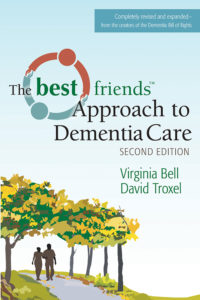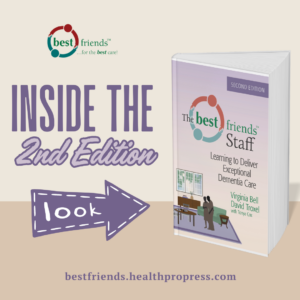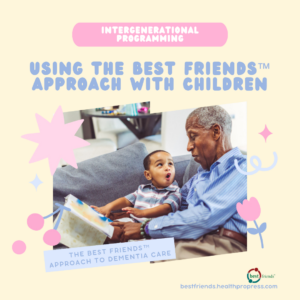
Moments Add Up and Make a Difference
We’d like for you to consider the following two scenarios. As you read them, we think you’ll begin to see how persons with dementia have many of the same needs that we do and how being a Best Friend can be a powerful tool for supporting quality of life.
Scenario 1
Imagine meeting an old friend for lunch and finding your normally upbeat, positive friend in tears. As a friend, how would you respond? You would probably:
-
Ask her what is wrong.
Try to get more information. She tells you that she has been laid off from a job that she loved and is worried about her financial future.
-
Show you understand and have empathy.
Let her know that this has happened to you and that her feelings of worry and disappointment are okay.
-
Affirm her feelings.
“It’s really terrible that they treated you that way. No wonder you are upset.”
-
Listen.
Focus, nod you heard, take time to hear her.
-
Give a compliment.
“You are so talented and the best salesperson.”
-
Be encouraging.
“The job market is strong right now. I’m sure you’ll get some offers and maybe even make more money!”
-
Offer a hug.
Do so only if you know she likes to be touched.
-
Use your sense of humor.
“You always told me you were tired of travel. Now you can stay home and watch Dancing with the Stars with us while we try out the newest cocktails!”
-
And, finally, change the mood, in this case with a favorite dessert.
“Let me treat you to that brownie sundae you love, with some extra whipped cream. Now is the time for chocolate!”
Your friend thanks you for your support, stops sobbing, laughs, and asks if you know any sales executives. By the last bite, you have truly been there for your friend. You’ve shown your support and cheered her up.
Scenario 2
Imagine a similar scenario in your memory care program. A resident who is normally calm and cheerful is sitting in her chair sobbing. As a Best Friends care partner, what should you do? You might:
-
Ask her what is wrong.
Try to get more information. Even though you know that her son visited this morning, she says she has not seen him in a long time, and she is worried about him.
-
Show you understand and have empathy.
Think about how you would feel if a child of yours didn’t visit you for a long time.
-
Affirm her feelings.
“No wonder you are feeling so sad!”
-
Listen.
Slow down, make eye contact, and nod your head.
-
Give a compliment.
“You are the best mom.”
-
Be encouraging.
“I’m sure he will be visiting soon. Let’s try his cell phone.”
-
Offer a hug.
Do so only if you know the person likes to be touched.
-
Use your sense of humor.
“That son of yours is such a funny character. You are going to have to set him straight the next time he comes!”
-
And, finally, change the mood or redirect, in this case with a favorite dessert.
“Let me treat you to your favorite chocolate ice cream with lots of whipped cream. Now is the time for chocolate!”
The resident relaxes, smiles, and begins talking about how proud she is of her son’s accomplishments.
The Same Approach
It’s remarkable that in these two scenarios your approach with your friend over lunch is the same approach you take with the resident. Both the old friend and the resident need a Best Friend to show understanding and empathy, to listen, and to cheer them up. Persons with dementia have all of the same needs that we all have. By engaging with them as friends, we can actually redirect and change sadness to happiness, fear to contentment. Friendship and empathy can transform the way person’s with dementia feel and behave.
Just like our friend who lost her job, all of us have moments such as sadness, anxiety, frustration. Using Best Friends strategies to show you understand and care, you may be able to move a person to more positive states of mind, even if just for a few moments. Those moments add up. Like pearls on a string, these moments begin to create, piece by piece, pearl by pearl, something beautiful. And that’s the goal of the Best Friends™ approach!
This blog post has been excerpted and adapted from The Best Friends Approach to Dementia Care, Second Edition, by Virginia Bell and David Troxel. Copyright © 2017 by Health Professions Press, Inc. All rights reserved.
For more on Best Friends, visit bestfriends.healthpropress.com.
Read the book!
The Best Friends™ Approach to Dementia Care
Second Edition
By Virginia Bell, M.S.W., and David Troxel, M.P.H.
Copyright © 2017 by Health Professions Press, Inc.
Successfully implement this relationship-centered approach to dementia care that builds on the essential elements of friendship—respect, empathy, support, trust, and humor.






Add comment